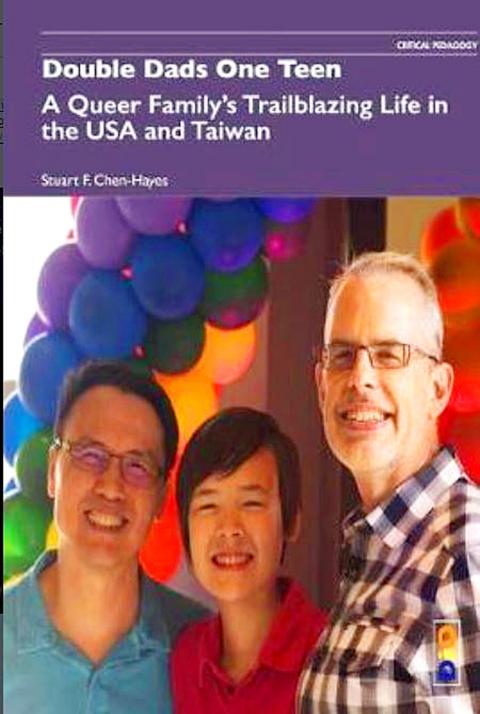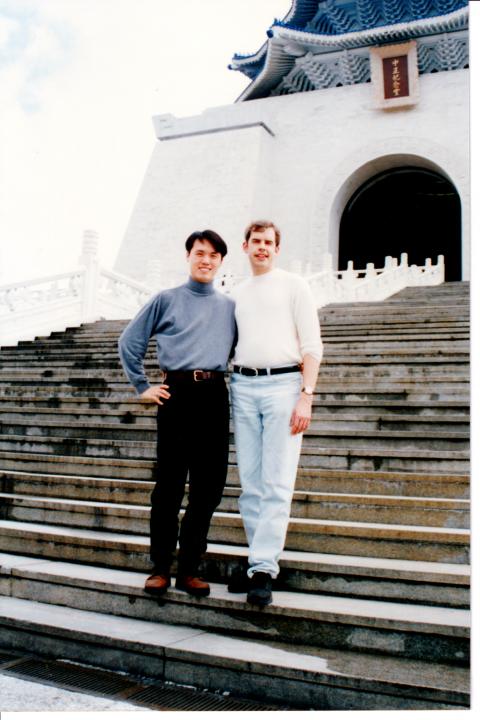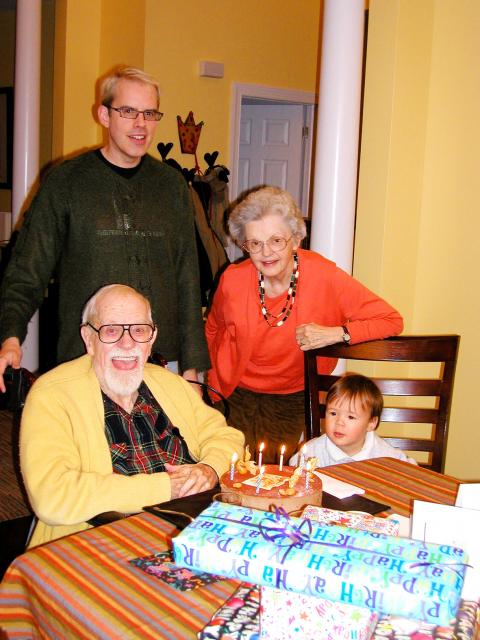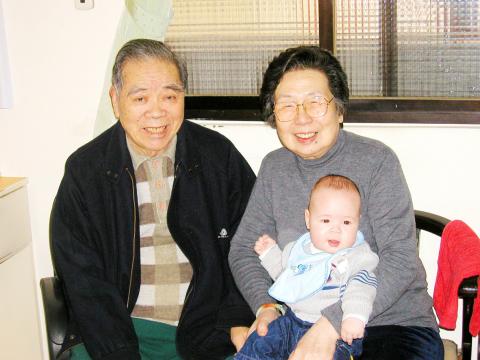“Who can stop us from celebrating?” That’s the axiom by which Lance and Stuart Chen-Hayes have lived, loved and parented as a gay couple for almost 20 years. Their journey is recounted with warmth and vigor in this new memoir.
Author Stuart Chen-Hayes is a professor of counselor education at Lehman College, City University of New York married to Taichung-born Lance Chen-Hayes (陳子良), a retired doctoral-level physical therapist. The couple are currently based in Pennsylvania, where their only child, Kalani Chen-Hayes (陳愷樂), is in high school.
Despite the Chen-Hayes’ academic pedigree and the book’s publication under the critical pedagogy series of New York-based DIO Press, the memoir uses a conversational tone and is filled with scenes and reflections from the couple’s own lives.

This makes the book not only a seamless, affable read — almost like chatting to the Chen-Hayes over coffee — but also an instructive example of how we can bear out abstract political and pedagogical convictions in lived experience.
Chapters are divided into milestones and periods in the Chen-Hayes’ lives, from the couple’s first date in Chicago in 1995 until the present.
The Chen-Hayes first confirmed their union with an exuberant commitment ceremony, which they call their “‘illegal’ wedding,” in July 1997. They augmented this with domestic partnerships and civil unions in the different US states where they lived over the years, until they were able to marry legally in New York in 2012.

Photo courtesy of Stuart and Lance Chen-Hayes
The most moving arc in their story happens early on and revolves around the Chen-Hayes’ siblings and parents. Lance’s process of coming out in adulthood first to his siblings (in a 24-page letter) and then mother is told in Stuart’s words, but retains the emotional potency of baring the truest version of yourself to your loved ones.
There’s a piercing resonance in the indirect way through which Lance’s parents ascertain the nature of their son’s relationship with Stuart, whom they first meet when the couple visit Taichung as “friends,” and later when Lance’s parents visit Chicago and stay at the couple’s home.
Real-life lines of dialogue immortalized in this portion of the book strike me as not being out of place in the screenplay for a film like The Wedding Banquet (喜宴), Ang Lee’s (李安) 1993 romantic comedy-cum-family drama about a mixed-race gay couple.

Photo courtesy of Stuart and Lance Chen-Hayes
Stuart’s sister Alison, who volunteers to be the surrogate when the Chen-Hayes decide to have a child, also cuts a memorable figure. Descriptions of her and other members of the Chen-Hayes’ “families of origin and family of choice” — the latter describing friends, teachers, colleagues and other sources of community — bear witness to the saying that it takes a village to raise a child.
That child is Kalani, who blossoms in the second half of the book as a courageous, articulate and sensitive youth activist. This is where the Chen-Hayes’ critical pedagogy becomes most evident, as Stuart describes the pains that they take to ensure their child grows up fluent in their own unique mix of cultural, ethnic and racial heritage.
Key to this parenting philosophy is the use of rituals to maintain and strengthen the family. This is in no way a concession by the author that two gay fathers do not make a real family. Rather, it’s in keeping with the queer sensibility that we choose and create our families as much as we are born into them.

Photo courtesy of Stuart and Lance Chen-Hayes
The Chen-Hayes’ rituals for Kalani range from the ordinary — home-cooked dinners every day — to the extraordinary, culminating in a “First Gay Teen Day” coming-of-age ceremony on Kalani’s 13th birthday that brought together loved ones to celebrate them. (Kalani identifies as queer, pansexual and non-binary, and uses the pronouns “they” and “them.”)
Stuart describes himself with Lance as an “out-of-the-closet, gay, mixed-race, dual-national, bilingual couple.” Standing at the intersection of many marginalized identities, the Chen-Hayes are fierce protectors of equality for themselves and others like them. This book serves as a chronicle of their activism, including the growth of LGBTQ activism in Taiwan from the mid-1990s, up to and including Lance’s activism for the national referendum concerning LGBTQ issues last November.
That Taiwanese angle will be made more prominent in the Chinese-language version of the book, authored by Lance and slated for release here next year. I look forward to reading more about Lance’s perspective on growing up gay in Taiwan, and how this society has progressed in protecting LGBTQ rights and equality.
Double Dads One Teen references several LGBTQ-sensitive pop culture products, including The Wedding Banquet, but also age-appropriate television shows, books and magazines that the Chen-Hayes shared with Kalani, serving as a reminder of the importance of diverse and inclusive cultural representation.
There is little doubt in my mind that this book itself is a welcome entry to that canon of literature for LGBTQ families.

On April 26, The Lancet published a letter from two doctors at Taichung-based China Medical University Hospital (CMUH) warning that “Taiwan’s Health Care System is on the Brink of Collapse.” The authors said that “Years of policy inaction and mismanagement of resources have led to the National Health Insurance system operating under unsustainable conditions.” The pushback was immediate. Errors in the paper were quickly identified and publicized, to discredit the authors (the hospital apologized). CNA reported that CMUH said the letter described Taiwan in 2021 as having 62 nurses per 10,000 people, when the correct number was 78 nurses per 10,000

As we live longer, our risk of cognitive impairment is increasing. How can we delay the onset of symptoms? Do we have to give up every indulgence or can small changes make a difference? We asked neurologists for tips on how to keep our brains healthy for life. TAKE CARE OF YOUR HEALTH “All of the sensible things that apply to bodily health apply to brain health,” says Suzanne O’Sullivan, a consultant in neurology at the National Hospital for Neurology and Neurosurgery in London, and the author of The Age of Diagnosis. “When you’re 20, you can get away with absolute

May 5 to May 11 What started out as friction between Taiwanese students at Taichung First High School and a Japanese head cook escalated dramatically over the first two weeks of May 1927. It began on April 30 when the cook’s wife knew that lotus starch used in that night’s dinner had rat feces in it, but failed to inform staff until the meal was already prepared. The students believed that her silence was intentional, and filed a complaint. The school’s Japanese administrators sided with the cook’s family, dismissing the students as troublemakers and clamping down on their freedoms — with

As Donald Trump’s executive order in March led to the shuttering of Voice of America (VOA) — the global broadcaster whose roots date back to the fight against Nazi propaganda — he quickly attracted support from figures not used to aligning themselves with any US administration. Trump had ordered the US Agency for Global Media, the federal agency that funds VOA and other groups promoting independent journalism overseas, to be “eliminated to the maximum extent consistent with applicable law.” The decision suddenly halted programming in 49 languages to more than 425 million people. In Moscow, Margarita Simonyan, the hardline editor-in-chief of the